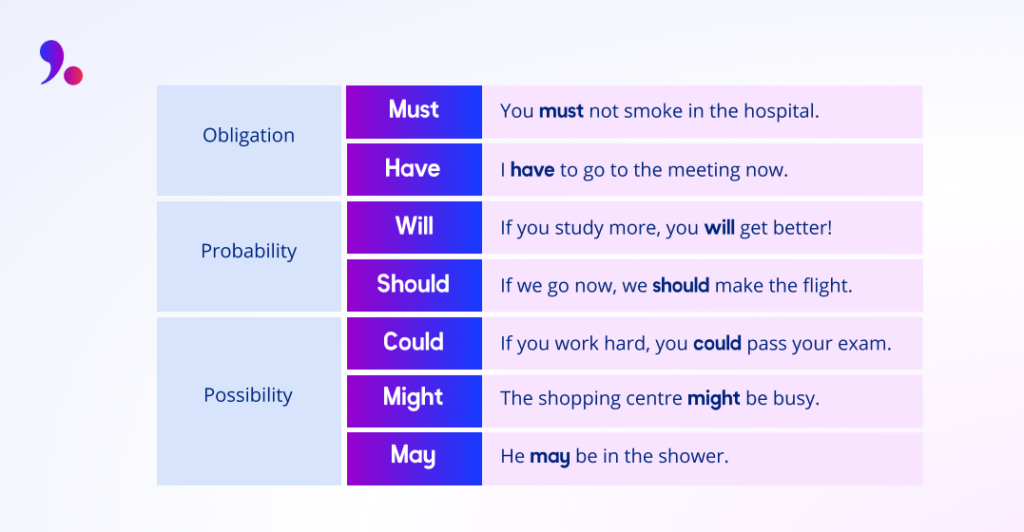by Joshua Rhys
Updated on February 17, 2025
Modal verbs in English can be tricky to get the hang of. Careless use of modals can present a bad first impression, and can even come off as rude, bossy or demanding. No one likes rudeness, so it makes sense to use them correctly. So, what are modals anyway? We will talk about modals of expressing obligation and necessity as well as those to express likelihood and probability.
Modals are a type of auxiliary (helping) verb – they work with other verbs to express a range of different meanings. The modal is always followed by a verb in the infinitive form.
As we will see, using the right modals in the right situation can help us be more specific with what we want to say. They can easily transform a short order into a polite request, for example.
Let’s look at some of the more common uses for modals – obligation and probability.
We can use modals to express obligation. An obligation is a necessity, or something you have to do. You must remember your partner’s birthday. Remember last year when you forgot? Yeah, you really don’t want that to happen again… When you have no choice in the matter, you can use the modals must or have to in order to express this. We can use each of them in a slightly different way.

Must shows an obligation we have no choice about, a strong obligation.
“I must feed the dog before I go out for the evening.”
You don’t want your poor pooch to go hungry, do you? Must can also be used when you are confident and sure about something happening in the present.
“The party starts at 10? We must leave soon.”
We can use must to talk in the past tense by adding have.
“Your friends are laughing? One of them must have told a good joke!”
Have to can be used to express a more external obligation.
“I have to get up at 6 o’ clock to get to work on time.”
Really, you would rather not, but you have little choice.
Modals have a negative form when you express an action the subject must not do. Here they are:
However, unlike with their regular forms, these don’t have the same meaning.
You use “must not” when you express something that is strictly prohibited:
When you use “must not”, performing the forbidden action has disastrous outcomes.
In the first example, driving after drinking is dangerous for you and the surrounding people. In the second example, eating rice has dire consequences for the subject’s health.
On the other hand, “don’t have to” isn’t a strong obligation, it’s more of a suggestion. You could do the action and it wouldn’t matter, it’s just something you are not forced to do.
The subject of the first example can work if they want to, it’s purely up to them. The same goes for the subjects in the second example: retaking the test isn’t forbidden to them, it’s just unnecessary.
Do you see the difference between “must not” and “don’t have to” now? The former describes an action that, if performed, leads to a negative outcome, while the latter is more of a tip, and nothing bad would happen by performing the action.
Since “must” expresses an obligation, it doesn’t have a past form. Either you have done what you must, or you haven’t. Maybe it’ll become a thing when we figure out how to time travel, but as of now, it wouldn’t make any sense to have it.
You will see “must have done something” referring to past actions. “Must” in this case is not used as a modal of obligation, but indicates speculation of what happened in the past, for example:
“Must” does not express obligation in these sentences, but a hypothesis.
The past form of “have to” is “had to”, and it’s used to express obligations in the past:
In typical English fashion, the past of “had to” can seem a little weird. You will see “didn’t have to” used in the overwhelming majority of situations, but “had not to” is also grammatically correct, just more very outdated.
Check the following examples:
Although both sentences are correct, the second one sounds off. I suggest always using the first form.
We can also use modals to express probability (how likely something is to happen) and possibility (a chance that something may happen or be true).
How likely is something to happen? If you are certain, use will.
“Your English will improve with practise, we have no doubt about that!”
What if you are quite sure, but not certain? We can use should to say something is likely to occur. If we leave now, we should make it in time. Like must we can talk about the past tense by using should have.
I was late for the meeting. I really should have set my alarm this morning!
Top tip: Should can also be used to give advice to others.
“You really should go and see you doctor!”
Perhaps you are unsure or uncertain of something happening? Try using the modals could, might, and may. These modals can help us explain that something is possible, but far from guaranteed.
“If you do a good job, you could be in line for a promotion.”
“Look at those rainclouds – it might rain tomorrow.”
“If you go to the kitchen, there may be a piece of cake left… if you’re lucky!”
The modal verb can also be used to express your ability to do something, asking permission for something, making requests and offering help. You can see that modal verbs cover a lot of roles in our sentences. What useful, hard-working little words!
